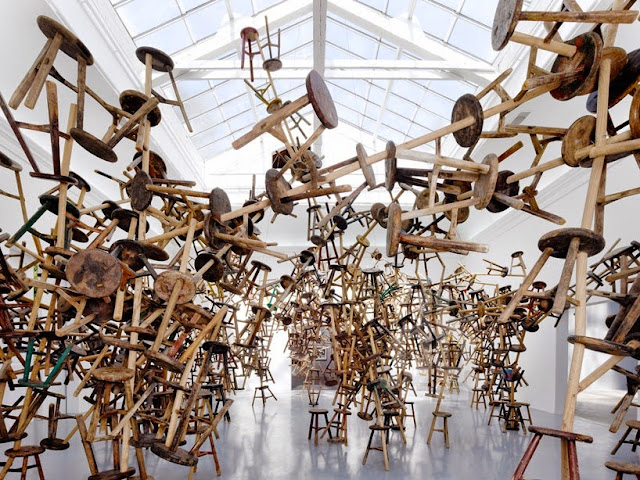Project Description
Reliefs
Relief is a sculptural technique where the sculpted elements remain attached to a solid background of the same material. The term relief is from the Latin verb relevo, to raise. To create a sculpture in relief is to give the impression that the sculpted material has been raised above the background plane.Using provided Slab Molds, you will use clay to design, draw, sculpt your relief and then cast in plaster. Must have at least 3 relief tiles.
Multiples
Why would you need multiples of an object? Is more always better? Why would an object need to be replicated? Think about the following definitions:
Mold - a hollow container used to give shape to molten or hot liquid material(such as wax or metal) when it cools and hardens.
Cast - an object made by shaping molten metal or similar material in a mold.
Multiples - Having, relating to, or consisting of more than one individual, element, part, or other component.
Using mold making and casting techniques, you will you plaster or latex to make a mold from an object.
Using what you have learned to develop concepts, come up with conceptual reasoning for making multiples of your object. You do not need to make complete reproductions of your object, but at least 3 casts.
Specifications
Your sculpture must have at least 3 multiples. There is no limitation on amount, color, or dimensions.
Use all the skills you have learned through the year, and build on these. Challenge yourself to think outside of the box... literally.
Evaluation
You will be graded on creativity, originality, and concept and craft. You will also be graded on your process (time-management, and working through multiple ideas).
Please note: You will need to take photos through your entire process. These will be submitted along with the final project. No project will receive an A without this documentation. Process is important.
Lastly, your project must have a title, and you must think of how it will be displayed. Presentation is part of context, and context drives meaning.
Schedule
Homework- Due March 12th and 14th
Your homework is to exercise the research and development stage of the creative process. You will do this by walking through the steps listed below.
Here are the things you will need to bring to class on March 12th:
3 Objects
As I told you last class, you need to bring in 3 objects to see which you will make a mold from. The object must me no larger than 8”x8”x8” and non-porous(look it up).
Homework- Due March 12th and 14th
Your homework is to exercise the research and development stage of the creative process. You will do this by walking through the steps listed below.
Here are the things you will need to bring to class on March 12th:
3 Objects
As I told you last class, you need to bring in 3 objects to see which you will make a mold from. The object must me no larger than 8”x8”x8” and non-porous(look it up).
For March 14th:
3 Detailed Drawings of your multiples
The drawings must be in your sketchbook using full pages(both sides when open) The drawing should show good use of the elements of design- line, form, color, texture, etc. (Note: These are fully-resolved drawings, NOT sketches)
In addition, the drawings should be informative; they should give us helpful information. Please be sure your drawings answer the following questions:
1. How are the multiples physically organized? Show details.
3 Detailed Drawings of your multiples
The drawings must be in your sketchbook using full pages(both sides when open) The drawing should show good use of the elements of design- line, form, color, texture, etc. (Note: These are fully-resolved drawings, NOT sketches)
In addition, the drawings should be informative; they should give us helpful information. Please be sure your drawings answer the following questions:
1. How are the multiples physically organized? Show details.
2. How many multiples will be used? Be detailed and use color/texture/collage to show this.
3. What do these multiples communicate? Descriptions/diagrams in the drawings should address this.
4. What concept are you engaging? Again, descriptions/diagrams could be helpful.
5. How is the form of your multiples communicating? Scale, shape, text, etc.
6. What is the working title? This should be clearly labeled in your drawing.
Molds 100% complete
You must come prepared with all materials and tools to work. Mold must be 100% complete and ready to cast.
3. What do these multiples communicate? Descriptions/diagrams in the drawings should address this.
4. What concept are you engaging? Again, descriptions/diagrams could be helpful.
5. How is the form of your multiples communicating? Scale, shape, text, etc.
6. What is the working title? This should be clearly labeled in your drawing.
Molds 100% complete
You must come prepared with all materials and tools to work. Mold must be 100% complete and ready to cast.
Read Essay: In defence of the poor image by Hito Steyerl in the dropbox
Answer Questions
https://goo.gl/forms/1cj0ojIH8tUJ9Ol03
Rubric for Homework
3 Objects = 25pts
3 Drawings = 25pts
Mold Complete = 25pts
Questions = 25pts--------------------------------
Total Possible = 100pts
A =100 - 90
B = 89 - 80
C = 79 - 70
D = 69 - 60
F = 59 - 0
Please be prepared at beginning of class with your own self-assessment based on the above rubric.
Final Project Due Date April 9th
Ai Wei Wei
Chris Burden















